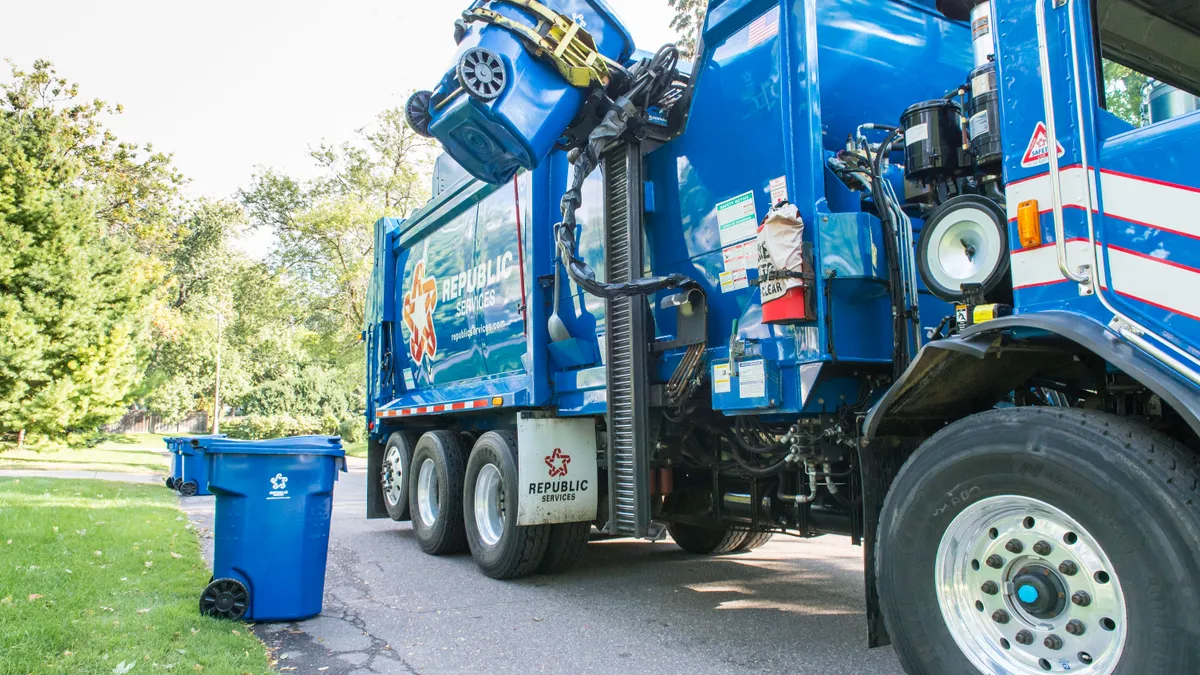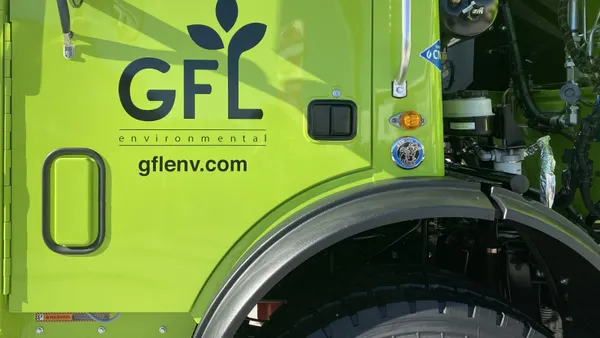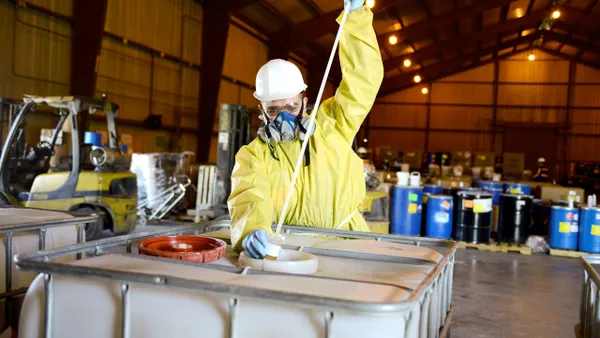UPDATE: May 5, 2021: Republic Services announced late Wednesday it has closed the acquisition of Santek Waste Services. “You rarely find an acquisition that has this level of post-collection assets and infrastructure," said President Jon Vander Ark during the company's first quarter earnings call, “and it fits perfectly into our footprint." Vander Ark attributed the "protracted" antitrust approval process in part to pandemic-related delays, but said the final divestiture amounts were in line with expectations.
Dive Brief:
- April 1: The U.S. Department of Justice's Antitrust Division (DOJ) and the Alabama attorney general's office filed a civil suit against Republic Services yesterday, seeking divestitures across Alabama, Georgia, Mississippi, Tennessee and Texas in order to approve the company's pending acquisition of Santek Waste Services.
- A proposed settlement would see two landfills, two transfer stations, four collection facilities and multiple small container commercial waste (SCCW) collection routes in the Southeast sold to Kinderhook Industries or an approved acquirer. The private equity firm's local portfolio companies include Capital Waste Services and EcoSouth Services. Certain Texas collection routes would also be sold to Waste Connections.
- This comes after Republic CEO Don Slager recently projected the deal would be closed by the end of the first quarter, during a February earnings call, following prior shifts in timing expectations. Republic declined to comment on the DOJ's announcement.
Dive Insight:
Originally agreed to in February 2020 (and first reported in March of that year), Republic's acquisition of the Tennessee-based private company is widely seen as a clear strategic fit that will strengthen its Southeast position.
While divestitures weren't entirely unexpected by some sources, despite indications by the company and others with knowledge of the process that the deal might be done soon, this new development will still extend timing beyond original expectations. Last May, President Jon Vander Ark originally projected the deal could close by the end of the year.
Launched in 1986, Santek has grown through multiple recapitalizations and acquisitions to become the largest private operator of publicly owned landfills in the industry and also has a sizable collection presence. According to the DOJ, Santek's most recent publicly reported revenue was $140 million in 2019 across nine states. Republic, which reported revenue of $10.2 billion in 2020, has a presence in 41 states – including the same ones as Santek.
In keeping with its traditional criteria of assessing competitive impacts to MSW disposal and SCCW collection, the DOJ found "consumers would likely pay higher prices and receive lower quality service" as a result of the pending transaction. Republic and Santek were identified as only two of no more than five key competitors for collection, and two of no more than three for disposal, in multiple markets.
Given the high barrier to entry for industry operations, the DOJ suggested the deal could "increase concentration significantly and substantially lessen competition and harm consumers in each relevant market by eliminating the substantial head-to-head competition that currently exists between Republic and Santek."
According to DOJ analysis, the proposed acquisition could lead to Republic controlling a majority of SCCW business in markets around Birmingham, Alabama; Chattanooga, Tennessee; adjacent parts of northern Georgia; eastern Montgomery County, Texas; and Hattiesburg, Mississippi. The greatest disposal effects were identified in parts of western Tennessee, as well as the northern Georgia and Chattanooga markets. In the latter area, an estimated 82% of local waste would either go through a company-operated transfer station or landfill without divestitures.
As a result, the DOJ proposes the divestiture of Santek's operations at the Murray County Landfill and a transfer station in Georgia, the Rhea County Landfill in Tennessee, a transfer station in Chattanooga and numerous collection facilities or routes across all five states. This excludes a disposal agreement with Putnam County, Tennessee, another with Clean Harbors and certain "hybrid contracts" involving collection stops that may fall outside the proposed route divestitures.
The proposed settlement also includes a potential disposal contract allowing Kinderhook's portfolio companies to dispose of up to 100,000 tons of MSW annually, for up to three years, at Republic's Pineview Landfill and Santek's Mt. Olive Landfill in Alabama. The Pineview site's pending closure in 2025 has been cited by sources as one potential factor in Republic wanting to strengthen its regional disposal options.
If the divestitures occur as proposed, this would mark a notable expansion for the two growing local companies backed by New York-based Kinderhook. South Carolina-based Capital Waste, acquired by the firm in 2019, completed four acquisitions last year. It now reports serving more than 64,000 residential customers, via 10 long-term contracts, along with 3,600 other commercial and industrial customers. Alabama-based EcoSouth, recapitalized by Kinderhook last year, operates the Axis Industrial Landfill in Mobile County.
Republic Services hasn't encountered a notable DOJ divestiture requirement since its much larger acquisition of Allied Waste Industries more than a decade ago, though this marks the second requirement for an industry deal in recent months. Waste Management's acquisition of Advanced Disposal Services resulted in an $863.5 million divestiture deal last October.
Financial terms for Republic's pending acquisition of Santek, or the value of the proposed divestiture package, have not been disclosed.












